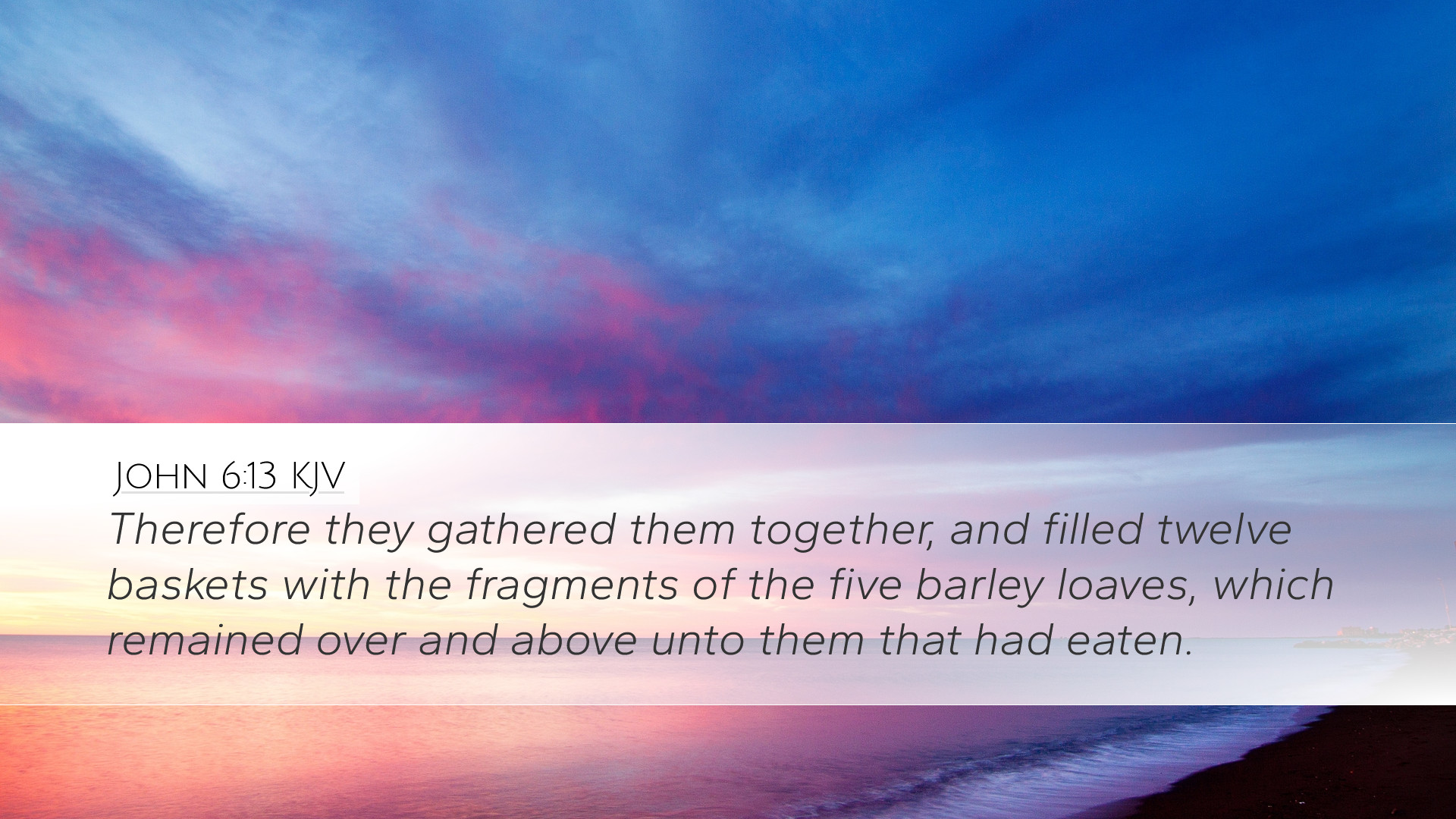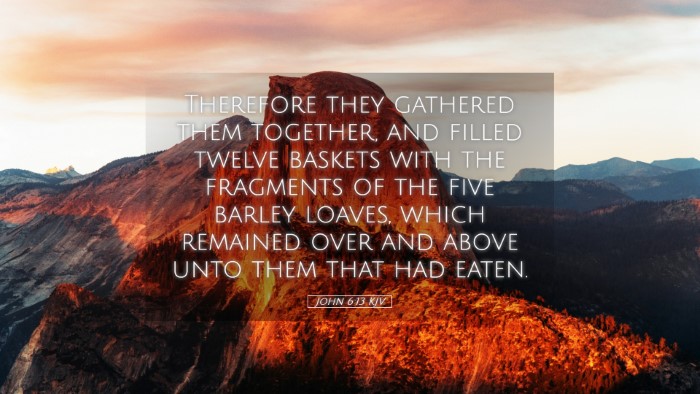Commentary on John 6:13
John 6:13 states: “Therefore they gathered them together, and filled twelve baskets with the fragments of the five barley loaves, which remained over and above unto them that had eaten.” This miracle of the feeding of the five thousand introduces several significant theological themes and mirrors the abundance of God's grace.
Context of the Miracle
This verse comes after Jesus performed the miracle of multiplying five barley loaves and two fish to feed a multitude. The disciples, who initially doubted the sufficiency of the provisions, witnessed the miraculous supply that resulted in an abundance of leftovers, illustrating God's provision and care for His people.
Significance of the Number Twelve
The mention of twelve baskets is rich in symbolism. Matthew Henry emphasizes the connection to the twelve tribes of Israel, signifying that God's provision is sufficient and extends to all His chosen people. This reinforces the idea that no one will be left out of God's generous grace.
Miracle of Abundance
Albert Barnes notes that the gathering of the fragments highlights Jesus's concern not only for the physical needs of the people but also for the stewardship of God's gifts. The leftovers signify that Christ's power is not just sufficient but superabundant. Here, the fragments serve as a reminder of God's extravagant blessings, emphasizing that the Lord can meet and exceed our needs. This illustrates the principle that God's grace is overflowing and that He supplies beyond our expectations.
Theological Reflections
From a theological perspective, Adam Clarke points out that the fragments serve a deeper spiritual significance. They symbolize the remnants of Christ's teachings and the nourishment that believers receive through Him. Each fragment can be seen as a testament to the sustaining power of Christ in the lives of believers, where every piece signifies spiritual truth that fortifies faith.
God's Providence and Care
In this passage, there is a profound reflection on God's providence. Henry remarks that the gathering of the fragments serves as an example of God's meticulous care – He is concerned even with the smallest aspects of our lives. Nothing is wasted in God's kingdom, and every fragment represents His constant provision. The emphasis on the leftovers acts as a reminder to believers that God is not only the provider but also a God who desires order and stewardship.
The Community Perspective
This miracle also contains a community aspect, which is vital for understanding the early Christian context. As the loaves were shared among the multitude, gathered pieces represent the sharing of Christ's body within the community of believers. Barnes reflects on the importance of communal worship and sharing of resources among believers, indicating that God’s blessings are meant to be shared and distributed, leading to greater unity within the body of Christ.
Application for Today’s Believers
For contemporary believers, this passage and its commentary yield several paradigms of application:
- Faith in God’s Provision: Just as in the miracle, believers are called to place their trust in God's capability to provide for their needs, especially when circumstances appear inadequate.
- Gratitude for Abundance: Recognizing and being thankful for the resources we have is vital. The gathering of leftovers highlights the practice of appreciating God’s providential care.
- Responsibility in Stewardship: The call to not waste the fragments serves as a reminder to manage our resources carefully, ensuring that we use our blessings wisely and for the benefit of others.
- Emphasis on Community: The shared nature of the miracle reflects the necessity of mutual support among believers, encouraging church communities to foster generosity and collective care.
- Finding Spiritual Nourishment: Each fragment points to Christ, inviting believers to seek spiritual nourishment from His word, deepening their understanding and relationship with Him.
Conclusion
John 6:13 encapsulates not just the miracle of provision but a profound lesson in faith, stewardship, and community. Drawing on the insights of commentaries from biblical scholars such as Matthew Henry, Albert Barnes, and Adam Clarke allows for a deeper exploration of this passage, encouraging readers to recognize and celebrate God's overflowing grace in their lives. Ultimately, it serves as a powerful reminder that in Christ, there is always more than enough.


